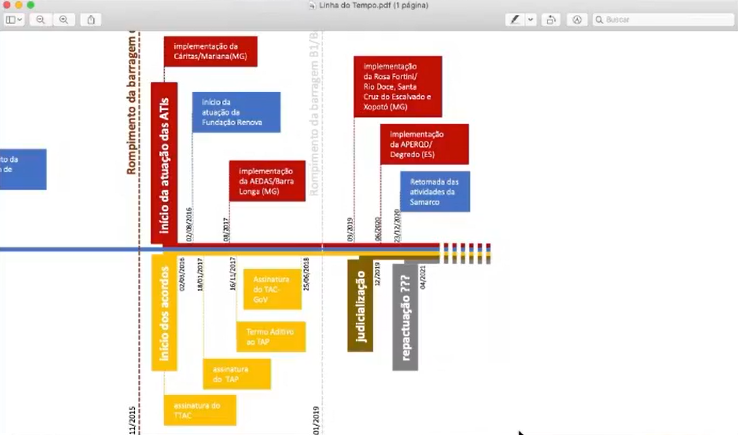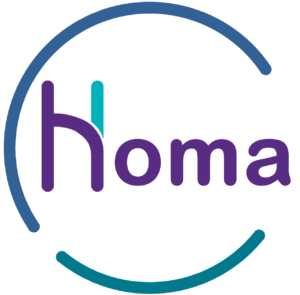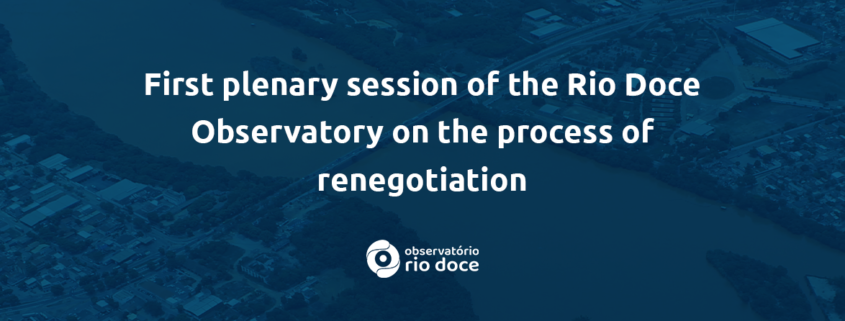In the first plenary session of the Rio Doce Observatory, the affected people made complaints, demanded participation and approved their proposals for the Rio Doce renegotiation
These proposals will be taken to the Rio Doce Task Force of the Public Prosecutor’s Office (MPF), to the National Justice Council (CNJ), to the State Legislature of Minas Gerais (ALMG), to the State Legislature of Espirito Santo (ALES), to the states of MG and ES, to the Chamber of Deputies and to the Senate through symbolic deliveries, meetings and hearings.

Last Tuesday, July 27th, at 6:30pm, the first General Plenary Session of the Rio Doce Observatory took place. The event was held online and aimed to discuss the “fair renegotiation with participation and respect for the agreements already signed” in a dialogue with organizations from different fields of action in defense of human rights.
The activity, coordinated by Thiago Alves, member of the coordination of the Movement of People Affected by Dams (MAB), began with a video presentation of the entities that make up the Rio Doce Observatory, explaining the history, the activities and the proposals of the organization regarding the crime in the Rio Doce river.
This was followed by initial motivational speeches. The first speech was by Dulce Maria Pereira, a professor at the Ouro Preto Federal University (UFOP), who pointed out that, since before the rupture of the territory, which has always been of interest of mining companies, the rights of the people who live in the region were already being taken away.
She also stressed that it is necessary to fight against this fragmentation and removal of rights, which occurs every day. According to the professor, this is an important moment in history and that the Observatory wants to change the relationship of the companies with the affected people, the territories, and life in general.
“We need to know that it will not be an easy fight, but it is a fight to be won, we are not here to lose this process.” – Dulce Maria
The event continued with a presentation by professors Tatiana Ribeiro and Karine (GEPSA/UFOP) representing the Rio Doce Research Network and contextualizing the timeline of the processes that involve the Rio Doce Basin in general, reinforcing the complexity of the processes after the burst.

Part of the Timeline with the events and legal processes involving the Rio Doce Basin presented by Karine and Tatiana.
For Tatiana, the burst is the collapse of the disaster, which begins long before the dam bursts – more specifically, it began when the processes that result in the decision about the location of dam would be built were made. She also pointed out that the TTAC (Transaction and Conduct Adjustment Term) “Agreement” was made without the participation of the affected people, the Public Prosecutor’s Office or the states’ Offices of the Public Defenders, having been concluded by other actors involved: the companies, representatives of the Brazilian federal government, the states of Minas Gerais and Espírito Santo.
After the Network’s presentation, Raphaela Lopes, member of the Global Justice, spoke about the internationalization initiatives of the Rio Doce case. The goal of this cross-cutting strategy is to achieve reparation and justice with international pressure.
To this end, complaints were filed before the Inter-American Commission on Human Rights and before the States in order to demonstrate the violations perpetrated as explicitly as possible. Another strategy used for this purpose was to bring up the case of great ruptures to the UN level. Among the complaints there are violations of the right to life, violation of the right to integrity of those affected, repression and persecution of human rights; persecution of the right to equality (environmental racism), and many others. Raphaela also mentioned the importance of the International Treaty on Human Rights and Business in this context.
The next to present was Eduardo Armond Cortes Araújo, advisor to SITICOP/MG. He explained what the defensive points of the process are (which is to prevent setback of rights already won) and the lines to advance in the proposal of Renegotiation. In the lines of advancement, Eduardo mentioned instruments of popular participation that allow the real involvement of the affected, decentralizing the decision spaces, currently concentrated in the Federal Court, and giving a greater role to the affected people. Among other points mentioned, it is also possible to highlight the request for technical assistance with autonomy and the capacity to direct demands, which would guarantee the informed participation of the families and the creation of Funds for regional development with investments to guarantee working conditions in several activities, such as farming and fishing.
Next, the floor was given to João Paulo Izoton, one of MAB’s Espírito Santo coordinator, who talked about the struggle for justice of the affected people. He denounced that there is no simple approval of the state in the injustices, but rather a participation of the state in the system of violation of rights. He also believes that the new agreement was only possible because of the victories in the Brumadinho crime case, which made it possible to recognize the problematic place of the Renova Foundation as the centralizer of the processes.
“What is missing in the Rio Doce case is real democracy”. – João Paulo, member of MAB Espírito Santo.
The voice of the people affected: basis of the Rio Doce Observatory’s action
The Plenary followed with the testimony of affected people from communities in both states. The first speech was given by Maria Marcia Almeida, who was affected in Colatina (ES), also a member of the Movement of People Affected by Dams. She talked about the actions of the entities involved in the Rio Doce Basin disaster and questioned the effective actions of the Judiciary of the involved states (Minas Gerais and Espírito Santo).
Márcia also reported that the organization of the disaster based on the violated rights of the affected people was done by Non-Governmental Organizations like the ones that are part of the Observatory, which highlights the lack of support of the affected people by the Justice and the importance of popular movements.
Lelis Barreiros, affected in Conselheiro Pena (MG), said that he has no recognition in any of his speeches in the technical chambers about the failure of the dam. He also criticized the disregard for the future of the affected 10 years from now, in the face of the flood of ore tailings that damaged the territory and the main source of water of the region. For him, the firms hired by Renova, a foundation created by Vale, are symbols of money laundering.
The next to speak was Lanla Maria Soares Almeida, who is part of the Comissão dos Atingidos (Commission of Affected People) in Governador Valadares (MG). She made clear her favorable opinion to the modifications of the Novel, since it was organized by commissions often without legitimacy and outside the parameters of the Fundo Brazil, and there were many commissions that did not participate in the discussions.
“We don’t want to be remembered only when they need us to finish their dissertations. It is time for the universities, which have much more power to speak than us, to join hands with the affected people. – Simone Silva, affected and MAB militant
The Plenary also counted with the presence of several partners in the struggle of the affected people. One of them is the Fórum em Defesa da Vida of the Vale do Aço, an articulation of leftist parties, unions, collectives, and popular movements that was represented by Dora Pereira. She made a parallel between the Rio Doce Basin disaster and the Covid-19 pandemic, and the difficulties that both presented together. She also reinforced the previous speeches regarding the renegotiation.
After Dora, it was Vinicius Alves, from the Fórum de Justiça, who spoke in the Plenary. He explained the structure of governmental institutions such as the National Justice Council (CNJ), which is coordinating the renegotiation, and the Office of the Public Defender, highlighting the need to occupy these spaces and dispute positions of power in these environments to promote significant changes.
“The river was our life, our wealth was in this river […] today there’s no more life, we are just surviving.” – Penha, from the executive secretariat of the Comissão de Atingidos
Another remarkable testimony was that of Simone Silva, a Barra Longa victim and MAB militant. According to Simone, the affected people were only able to conquer some of their rights thanks to the protests. She also criticized the actions of the governor of Minas Gerais, Romeu Zema, in relation to the disaster. For the activist, the affected people need to be politically organized to understand the renegotiation process and, thus, demand their rights.
The last testimony that closed the Plenary was given by Joelma Fernandes, who reported the drama of the 22 affected people commissions in Governador Valadares and the risks faced to keep the discussion about reparation in pandemic times. Joelma also denounced that the first people to enter the simplified compensation program received good offers as a way to deceive and influence the rest of those affected to join the program.
“It is through these meetings that we, the affected people, can talk about what suffocates and afflicts us so much.” – Joelma Fernandes, affected in Governador Valadares
Throughout the activity, the coordination team dialogued with the people who expressed themselves through social medias, chats and the Google Meet open room. This dialogue also resulted in the approval of all the proposals presented in the Plenary that had been previously elaborated by MAB and other grassroots organizations in the Basin as a minimum agenda for a fair renegotiation.
These proposals will be taken to the Rio Doce Task Force of the Public Prosecutor’s Office (MPF), to the National Justice Council (CNJ), to the State Legislature of Minas Gerais (ALMG), to the State Legislature of Espirito Santo (ALES), to the states of MG and ES, to the Chamber of Deputies and to the Senate through symbolic deliveries, meetings and hearings.
Participating in the first General Plenary were people affected in Vitória, Serra, Linhares, São Mateus and Conceição da Barra, in Espírito Santo, and Santa Cruz do Escalvado, Ponte Nova, Rio Doce, Barra Longa, Periquito, Governador Valadares, Tumiritinga, Aimorés, São José de Bicas, Congonhas, Belo Horizonte, in Minas Gerais.




Leave a Reply
Want to join the discussion?Feel free to contribute!